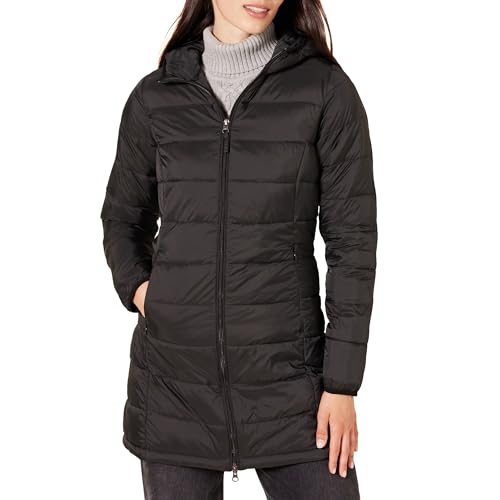Winters in Turkey: 7 Pros and Cons of visiting Turkey during winter
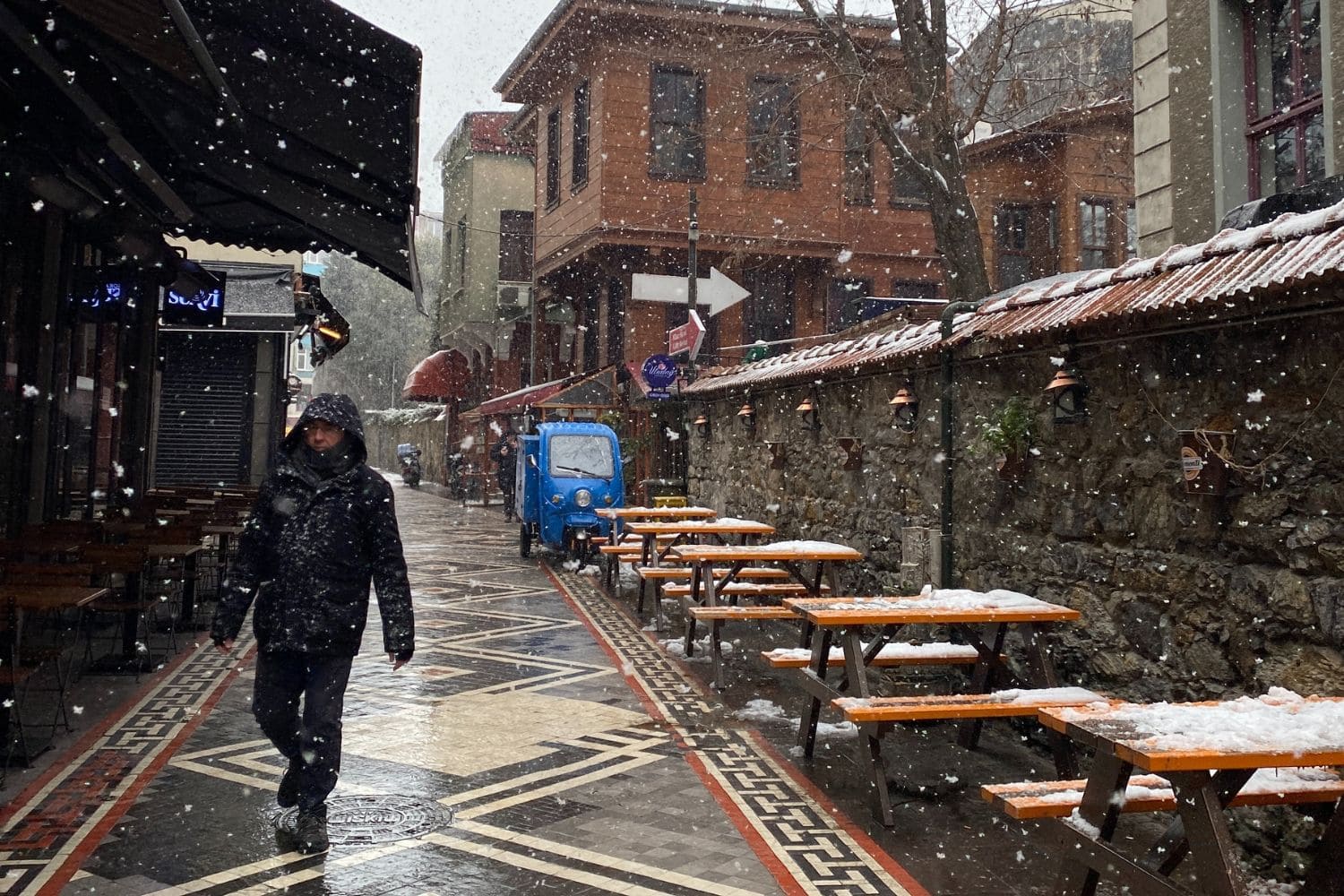
The Art of Living in Turkey contains affiliate links and is a member of the Amazon Services LLC Associates Program. If you make a purchase using one of these Amazon links, I may receive compensation at no extra cost to you. See my Disclaimers for more information.
As a seasoned traveler to Turkey and a resident of this diverse and beautiful country since 2019, I can confidently say that winters in Turkey have both pros and cons.
Having explored various places in Turkey during winter, I have witnessed firsthand the unique charm and allure of this time of year and the difficulties.
From the snowy slopes of Uludağ to the cozy cafes of Istanbul, winter in Turkey offers a variety of experiences that any traveler would be remiss to miss.
As you prepare for a trip to Turkey, I am excited to share with you all the reasons why it may be either the best or the worst decision based on what you hope to get out of your trip.
I’ll also share a few must-do winter experiences to make the most of your trip.
Avoid having unmet expectations by understanding what Turkey has to offer during the winter. Let’s jump in!
6 Must-Have Winter Accessories
- Stay warm with a Lightweight Water Resistant Puffer Coat. If you don’t get this one, I definitely recommend water resistant along with warmth.
- This Pashmina Scarf/Shawl is great because it can be worn in multiple different ways. If you’re headed to Turkey, you can also just get one here for a pretty great price!
- This epic Infinity Scarf has hidden pockets and makes a perfect travel companion.
- If you’re headed out east, I definitely recommend some HotHands Hand Warmers. They will keep your hands warm in the coldest places.
Average Temperatures Throughout Turkey in Winter
All temperatures are in Fahrenheit and include the low and high for the month.
| Ankara | Antalya | Erzurum | Istanbul | Izmir | Trabzon | Van | |
|---|---|---|---|---|---|---|---|
| December | 28-44° | 42-62° | 8-30° | 42-52° | 42-57° | 44-56° | 23-41° |
| January | 25-41° | 42-59° | 1-25° | 38-48° | 39-54° | 41-52° | 19-37° |
| February | 26-45° | 43-61° | 3-28° | 39-49° | 40-56° | 40-52° | 20-38° |
9 Pros and Cons of a Turkey Vacation during Winter

1. PRO: Fewer Crowds
Traveling with fewer tourists around offers several benefits. While I’m typically a “shoulder season” traveler, winter travel has its own unique advantages.
Firstly, without the bustling crowds, you can better connect with the local culture, interact with locals, and fully appreciate the destination’s ambiance.
In addition, open tourist attractions and landmarks often have shorter queues and reduced waiting times, allowing you to explore at your own pace and enjoy the sights without feeling rushed or overwhelmed.
Traveling in a quieter season also means you can discover peaceful spots to unwind, appreciate the natural beauty around you, and create lasting memories.
Ultimately, it can make your vacation far more relaxing and enjoyable.
2. Con: Cold, Unpredictable Weather
Winter weather in Turkey varies greatly depending on where you are, but it is generally the wettest season across the country.
The weather can change rapidly; one minute it might be sunny or slightly overcast, and the next, you’re caught in a downpour. Be prepared for anything!
Additionally, bundling up in layers and facing the cold can restrict mobility and make outdoor activities less enjoyable.
If you’re the type who loves wearing layers, you might not mind, but I find multiple layers uncomfortable—plus, I tend to run warm, so I don’t need as many.
Bad weather, such as heavy snowfall or sleeting rain, can also disrupt travel plans in some areas. Flexibility is key in winter travel.
If you’re along Turkey’s coast, winter temperatures are mild, but the further inland you go, the colder it becomes.
While flights are rarely delayed or canceled, roads may become slippery or impassable, and some outdoor attractions or national parks may close for safety reasons.
That said, the cold weather brings unique seasonal pleasures, like warming up with a cozy cup of salep, a traditional drink available only in winter.
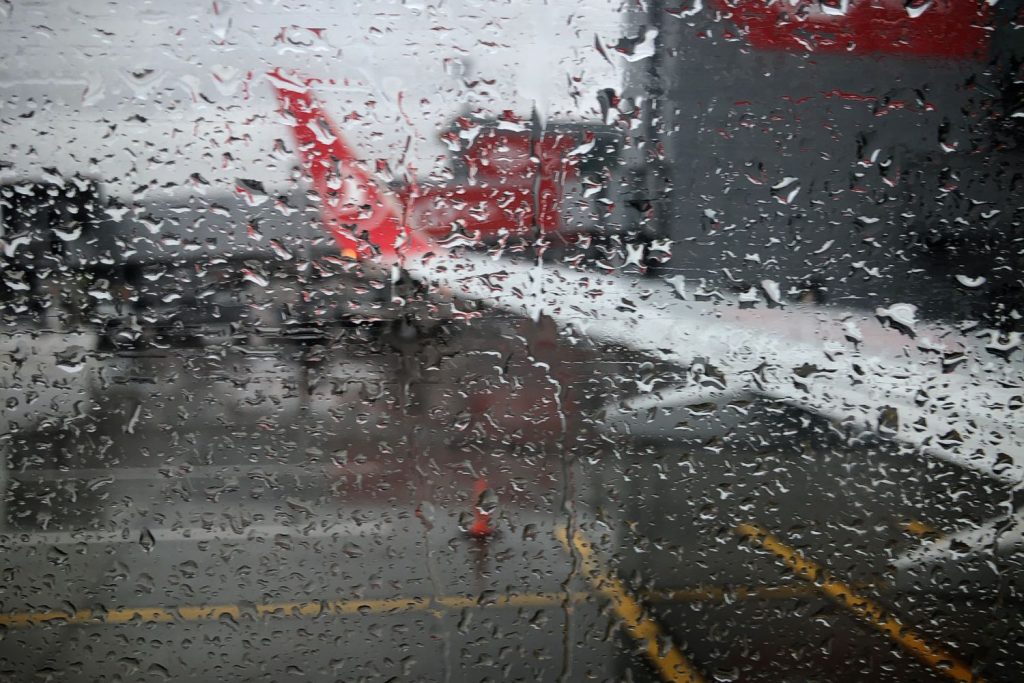
3. Pro: Lower Prices
Winter travel often means lower prices especially if you fly in November.
Flights to and from popular destinations in Turkey can be significantly cheaper compared to peak seasons—unless you’re traveling around Christmas or New Year’s.
Pro tip: I love using Kayak’s “explore” feature. If you have flexible travel dates, you can score even better prices.
Accommodation rates also tend to drop, making it easier to find great deals or even upgrade to high-end stays at a lower cost.
Additionally, many tours, attractions, and activities offer discounts or special promotions during the off-season to attract visitors.
While not all tours operate in winter, many do run year-round, especially in places like Istanbul and along the Mediterranean coast.
4. Con: Limited Accessibility
Some attractions, especially those in remote areas or at higher altitudes, may have limited accessibility or may even close during winter.
This can restrict your options for exploring certain parts of Turkey, particularly if you have specific landmarks or natural wonders on your itinerary.
For example, if Sumela Monastery is on your bucket list, winter isn’t the time to visit. The road is rough on a good day and is closed during winter.
Similarly, remote archaeological sites or cultural attractions may have reduced visiting hours or be completely closed during the off-season.
If you enjoy live music, be aware that street performances are rare in winter, unlike in spring, summer, and fall.
To avoid disappointment, it’s essential to research and plan accordingly if your desired destinations may not be accessible during this time.
That said, Turkey still offers plenty of attractions and experiences during winter, ensuring a fulfilling and memorable trip.
5. Con: Shorter Daylight Hours
Winter days are shorter, which means less daylight for outdoor activities. I often find myself needing to leave before sunrise, which isn’t my favorite.
This experience is probably familiar to anyone living in a seasonal climate.
If you have a packed itinerary or prefer longer sightseeing days, you might find the reduced daylight limiting. But if you’re a museum enthusiast, it may suit you perfectly.
Keep in mind that some outdoor sites or activities may have specific hours and are best enjoyed in daylight.
In Istanbul, for example, you’ll find a wealth of museums, bazaars, mosques, and art galleries to enjoy regardless of daylight hours.
The winter ambiance and shorter days also create a cozy, magical atmosphere, making evenings in charming cafes or traditional tea houses feel all the more enchanting.
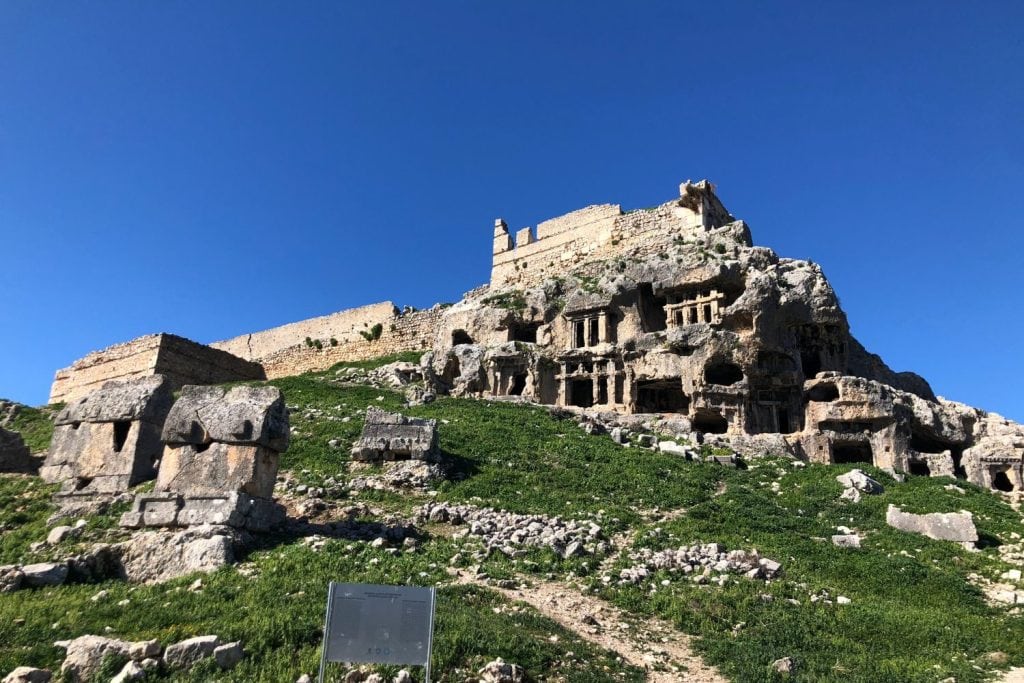
6. Pro: Unique Cultural Experiences
Turkey has a rich cultural heritage, and visiting during the winter allows you to witness unique events and festivals.
For instance, you can experience vibrant New Year celebrations, especially lively in major cities like Istanbul and Ankara, featuring fireworks, street parties, and special events.
Winter is also an ideal time to witness the mesmerizing Whirling Dervishes ceremonies at the annual festival in Konya.
The Whirling Dervishes Festival is a captivating spiritual event that draws visitors worldwide, commemorating the death of the great Sufi poet Rumi with the mesmerizing Sema ceremony.
You can also see traditional belly dancing shows either on a Bosphorus Cruise or all on its own.
You can immerse yourself in the local customs and gain a richer, deeper understanding of Turkish culture.
7. Con: Limited Beach Activities
Turkey’s coastal areas are stunning, but visiting in winter means the beach experience won’t be the same.
Swimming and sunbathing are typically off the table due to cooler temperatures and rough seas. That said, some winters feel more like spring, but this isn’t the norm.
However, Turkey’s coastal towns, like Fethiye, still offer unique charm in winter.
You can take scenic walks along the shoreline, admire breathtaking sea views, savor fresh seafood and local raki at waterfront restaurants, and explore quaint seaside villages—all without the crowds of peak tourist season.
If beaches are your priority, late spring and early fall offer the best of both worlds: fewer crowds and ideal weather.
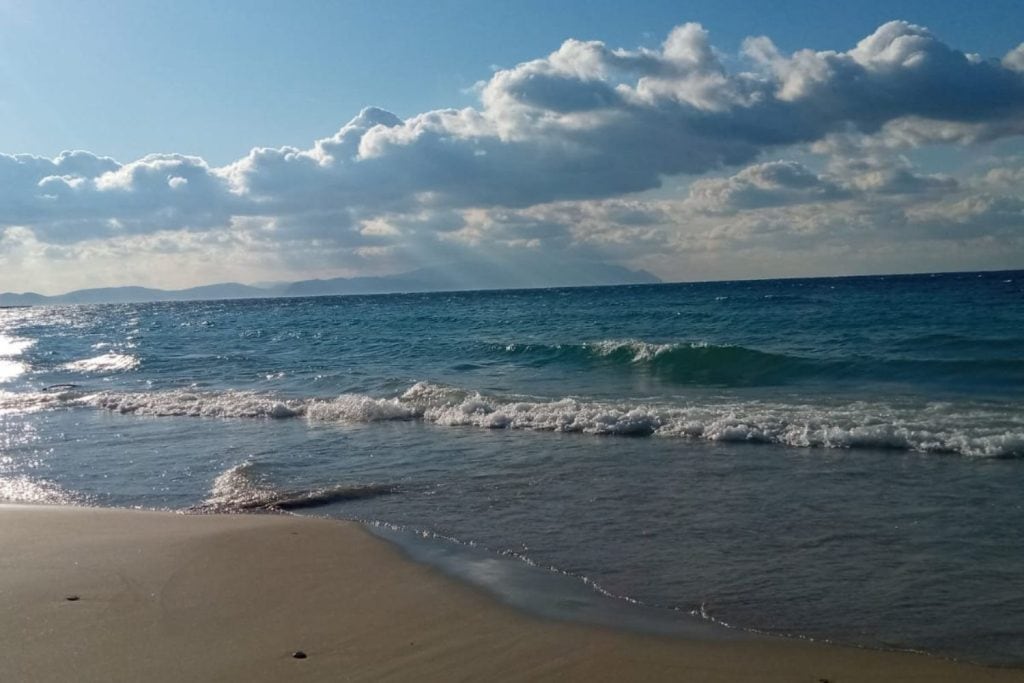
7 things to do in Turkey during the Winter Season
1. Hot Air Balloon in Cappadocia
A winter hot air balloon ride in Cappadocia is a truly magical experience.
The crisp winter air adds a special touch as you ascend, with views of snow-capped fairy chimneys, ancient cave dwellings, and snowy valleys.
The contrast of colorful balloons against the serene winter backdrop creates a mesmerizing spectacle, especially as the soft golden sunrise pierces through the mist.
Pro tip: Schedule your ride for the first available day, as off-season weather can lead to cancellations. An early booking gives you time to reschedule if needed.
Read this article to find out other things to do in Cappadocia while you’re there.
2. Explore Istanbul without the Crowds
The city’s rich history, diverse culture, and iconic landmarks take on a special allure in winter.
The Hagia Sophia and Blue Mosque dusted with snow create a mesmerizing sight, while the city’s vibrant art scene hosts captivating winter exhibitions.
Enjoy Istanbul’s culinary delights, such as hearty soups, grilled kebabs, and traditional Turkish tea, to stay cozy. A Turkish bath, or hamam, provides a perfect escape from the cold.
Don’t miss leisurely walks along the Bosphorus, with panoramic views of the city skyline and the recently restored Maiden’s Tower.

3. Rest in Antalya
Antalya, known for its Mediterranean beauty, offers plenty to enjoy year-round.
The historic old town of Kaleiçi, with its cobblestone streets, Ottoman-era architecture, and charming shops and restaurants, is a must.
Visit the Antalya Museum’s impressive collection of ancient artifacts or explore the Antalya Aquarium, which showcases diverse marine life.
End your day with a relaxing visit to one of Antalya’s renowned spas and hamams, or savor Turkish cuisine at local cafes while enjoying Antalya’s mild winter climate.
4. Take the DoĞu Express train
A ride on the Doğu Express in winter offers breathtaking views of Eastern Turkey’s snow-covered mountains, frozen lakes, and charming towns.
The cozy train atmosphere, hot drinks, and camaraderie among passengers create a unique travel experience.
The train stops in notable destinations like Kars and Erzurum, where you can explore historic sites, enjoy local cuisine, and experience the region’s unique culture.
You could travel to Kars and enjoy the next item on this list for an epic winter adventure.
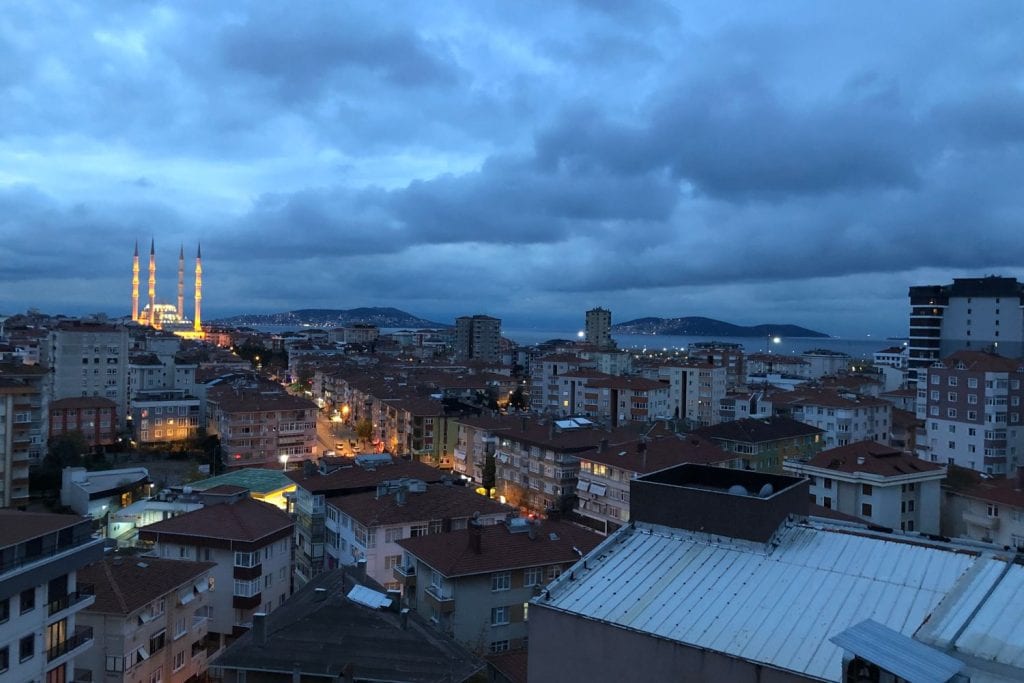
5. Visit the Magical Far East
Kars transforms into a winter wonderland with snowy landscapes and a charming old town.
Explore the medieval Kars Castle, and wander the narrow streets of the old town, where Ottoman-era architecture and wooden houses create a fairytale-like scene.
The Ani Ruins, a UNESCO World Heritage site, offer a chance to explore ancient Armenian history in a peaceful winter setting.
Kars hosts a vibrant Snow Festival with snow sculptures, traditional performances, and winter sports. Don’t miss Lake Çıldır, an easy day trip from Kars.
Enjoy hearty local cuisine, including kadayıf dolma (a Turkish dessert) and local cheeses, for a warm culinary treat.
6. Winter Sports in Your Pick of Cities
Turkey’s mountainous terrain offers fantastic destinations for skiing, snowboarding, and other winter sports.
Uludağ near Bursa is a popular ski resort with various slopes and modern amenities, easily accessible from Istanbul.
Palandöken in Erzurum features challenging slopes, while Kartalkaya in the Köroğlu Mountains offers picturesque trails for beginners and intermediates.
These ski resorts provide exhilarating adventures and cozy accommodations, equipment rentals, and ski schools.
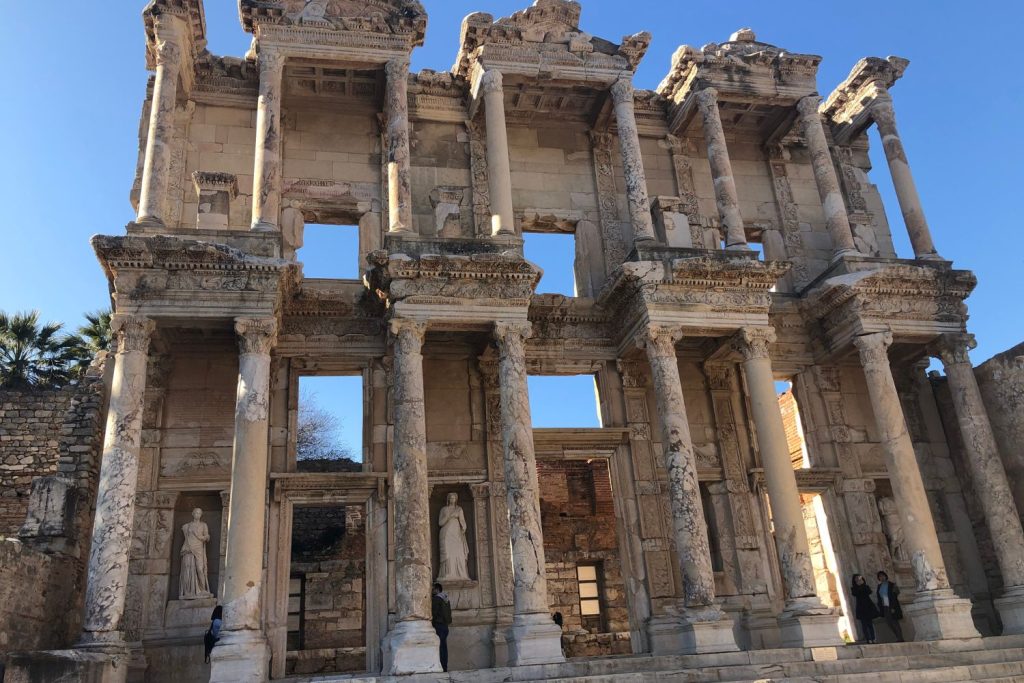
7. Check out the Thermal Spas
If you’re missing the beach, Turkey’s thermal spas might be the perfect substitute.
Southwestern Turkey has several destinations with natural thermal springs, offering a soothing escape from winter.
Pamukkale, a UNESCO World Heritage site, is famous for its white mineral-rich pools, attracting visitors year-round.
Other popular thermal destinations include Çeşme, Yalova, and Konya, each offering unique spa experiences.
With options like traditional hamams and modern wellness centers, these spas provide therapeutic treatments, massages, saunas, and more for a rejuvenating retreat from winter’s chill.
Travel Tips: 3 Things to Pack for your visit to Turkey
Rain jacket
You could, of course, bring an umbrella instead but I will caution you with this…it can be windy and the umbrella will do nothing. I prefer to have a waterproof backpack and a good rain jacket for my life in Turkey.
I recommend you get one that is a bit longer as well. You can use a disposable poncho but during the winter, the extra layer doesn’t hurt.
Wate-proof shoes
This is maybe the most important recommendation. I am a bit sensitive as my feet are the only thing to ever get cold in winter weather.
With how wet it can be, it is so important to have good shoes that are comfortable to walk around for hours and that will keep your feet dry and warm.
Make sure you break them in before you come to avoid blisters.
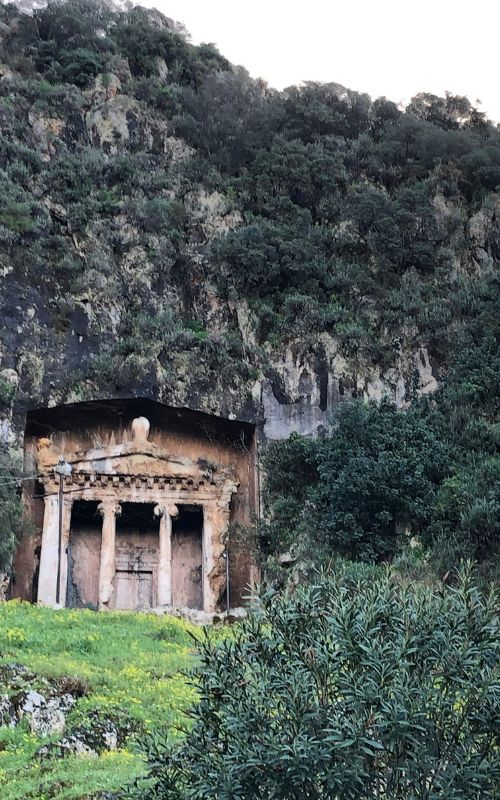
I bought these Xero women’s boots when I was back in the States and I literally wear them 6 of 7 days during the winter. Just make sure you treat them well and they will last a long time.
Water-proof bag
You wanna make sure your electronics and important documents stay dry while you’re out and about exploring beautiful Turkey.
There are so many great bags out there that are water-resistant and water-proof. I went a bit overboard with mine because I am often carrying my laptop with me.
This is the one I use. Inexpensive yet keeps everything dry!
FAQs About Your Visit to Turkey in Winter
Is Turkey a good winter destination?
Yes, Turkey is a good winter destination. In Turkey, you can have a winter sports holiday, go hiking on the Mediterranean coast, explore Eastern Turkey, and so much more.
What is the weather like in Turkey at Christmas?
The weather in Turkey at Christmas depends on where you are. But it ranges anyway from 8-62° F. You can definitely find something to do over the Christmas holiday in Turkey.
How safe is travel to Turkey?
It is quite safe to travel to Turkey. Of course, you need to be aware of your surroundings and be aware that in touristy areas there is a higher likelihood of being pickpocketed. Make sure you keep everything on your back and close to you if you don’t want it taken.
Is Turkey an affordable vacation?
Yes, Turkey is an affordable vacation. Depending on what you like to do your budget should be anywhere from $30 – $200 a day. For budget travel, however, you should be able to get by with $30-$40.
What is the best month to go to Turkey?
The best month to go to Turkey is April, May, September, and October. This is shoulder season so the prices are lower, there are less crowds, and the weather is perfect.
Do Americans need a visa for Turkey?
As of December 22, 2023, Americans do not need a visa for Turkey. Americans can enter Turkey for 90 days out of 180 days, fee-free.
Does it snow in Turkey?
Yes, it snows in Turkey though more snow falls in the Eastern part of the country whereas the Western coast is more temperate in temperatures. Istanbul can still see snow once or twice in a season, however.
Final Thoughts: Winter in Turkey is totally worth it!
Visiting Turkey during the winter offers a unique and captivating experience, perfect for travelers seeking a diverse and enchanting destination.
While Turkey is often associated with sunny beaches and vibrant summers, its winter charm unveils a whole new side of the country, highlighting its rich history, natural beauty, and warm hospitality.
This time of year, Turkey transforms into a winter wonderland, showcasing stunning snow-blanketed landscapes and offering a variety of seasonal activities.
From skiing in the majestic mountains of Uludağ and Palandöken to exploring Cappadocia’s fairytale-like scenery under a pristine white blanket, winter enthusiasts have plenty to enjoy.
Festivals and celebrations also bring Turkey to life with vibrant traditions, music, and dance, providing the perfect chance to immerse yourself in local customs and create lasting memories.
In short, winter can be the ideal time to visit Turkey—though it may not suit everyone. I hope to see you here!
Ready to start packing? Grab my Ultimate Packing list for free!

Read More:
- Is Turkey safe?
- 23 Travel tips for your trip to Turkiye
- Packing Travel Hacks: 18 things you should always pack for a better trip
- Turkish for Tourists: What You Need to Know to Have a Great Vacation
Turkey Vacation Basics
When I plan a trip these are the websites I use. I hope they help you plan your next adventure as well!
FLIGHTS: I am a huge fan of Skyscanner and WayAway.
VISAS: You can use the free e-visa portal here but for a few extra dollars you can use iVisa and someone else will handle any issues that may come up.
E-SIM: When I traveled to SE Asia I discovered e-sims and I’m never going back. Airalo has been easy and cheap!
TRAVEL INSURANCE: I use TravelInsurance.com for my trips abroad.
CAR RENTAL: I have loved working with Discover Cars when I rent cars in country.
AIRPORT TRANSFERS: I have used these transfers many times and they are always great. If you’d like more options, I also recommend GetTransfers.com as they allow you to compare companies.
ACCOMMODATION: Find the best Turkey hotel deals on Booking.com.
CITY TOURS & DAY TRIPS: You can browse GetYourGuide’s website to find just the tour you’re looking for! We also recommend the MegaPass for major cities.

